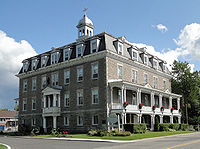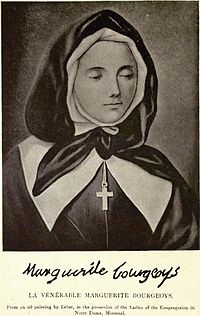- Congregation of Notre Dame
-
 Former convent of Congregation of Notre Dame, Boucherville, Quebec
Former convent of Congregation of Notre Dame, Boucherville, Quebec
 La Venerable Marguerite Bourgeoys by Pierre Le Ber in the possession of the Ladies of the Congregation of Notre Dame, Montreal
La Venerable Marguerite Bourgeoys by Pierre Le Ber in the possession of the Ladies of the Congregation of Notre Dame, Montreal
The Congregation of Notre Dame was founded in 1653 by Marguerite Bourgeoys in Montreal, Canada.[1] This was one of the first non-cloistered communities. The community's motherhouse has continued to be based in Montreal. Members of the community live in Canada, United States, Japan, and several developing nations, for a total of nine countries on four continents.
In 1668 Bourgeoys purchased Maison Saint-Gabriel in Montreal, a farm property which the sisters of the Congregation of Notre Dame operated for nearly 300 years. It was temporary home for some of the King's Wards, also called the King's Daughters, or Filles du Roi. On the property, sisters produced food and products to support the Congregation of Notre Dame, new settlers and others in need. Today the property has been developed as a living museum of farming and historic times. The property, outbuildings and grounds have been restored.[2]
The community is centered on the mystery of the Visitation: the story of the Blessed Virgin Mary's visiting Elizabeth. The sisters of the community are engaged in active social justice, emulating their founder's admonition of "little, simple and poor". Members of the congregation do not wear a habit, a traditional type of dress; rather, they dress in simple contemporary clothes. The religious community has long had a strong commitment to education, from establishing schools in New France to teaching students and teachers in developing countries.[3] In many countries, such as Cameroon, they take an active role in teaching classes. They also train indigenous teachers.
See also
References
- ^ Buescher, John. "Religious Orders of Women in New France," Teachinghistory.org, accessed August 21, 2011.
- ^ "History", Maison Saint-Gabriel Website, accessed 6 Feb 2010
- ^ "N. S. exhibit shows sisters' efforts: Notre Dame sisters provided education in 18th century Louisbourg", Western Catholic Reporter, 7 May 2001
External links
- Congregation of Notre Dame - Official website
- Schola Ministries - A CND Ministry
This article on the Catholic Church, Catholic institutions, and wider society is a stub. You can help Wikipedia by expanding it.
